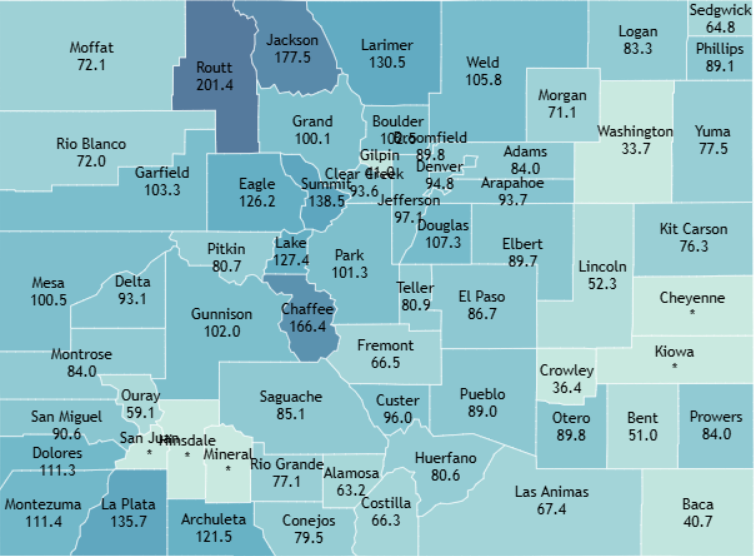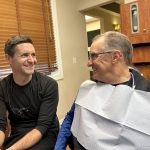Routt County recorded highest prostate cancer rates in Colorado in 2020-2022
Men at normal risk advised to start annual PSA blood tests at 50

Suzie Romig/Steamboat Pilot & Today
Data from the Colorado Central Cancer Registry shows Routt County had the highest rate of prostate cancer among all Colorado counties during the three-year time span between 2020 and 2022.
That fact should encourage Routt County men 50-and-older, even with no family prostate cancer risk, to talk with their doctors about getting screened annually for prostate-specific antigen, or PSA, according to American Cancer Society recommendations. Men with a first-degree family member diagnosed with prostate cancer before age 65 or Black men are encouraged to start annual PSA screenings at age 45.
Routt County shows “a significantly higher rate than the Colorado rate” for prostate cancer diagnoses from 2020 to 2022, according to Jan Lowery, Ph.D., at the CU Cancer Center at Anschutz Medical Campus in Aurora. Lowery was among the CU Cancer Center staff educating community members during an interactive and informative Oct. 17 Research Roadshow conducted in Steamboat Springs.
Using a statistical comparison rate of 100,000 men to rank the incidence rates accurately between smaller and larger counties, Routt had the highest incidence rate of 201.4 per 100,000 men during 2020-22, compared to the statewide rate of 98.2 per 100,000 during the same three-year period. The most recent year of data available from the Colorado Central Cancer Registry is 2022.
Why is the prostate cancer incidence rate so high in Routt County?
Lowery said one factor of the high prostate cancer rate is the increasing average age of the Routt County population that attracts a lot of active but older residents.
“Advanced age is the most important risk factor,” Lowery said. “The percentage of people age 65-plus in Routt increased from 8.3% in 2010 to 18.8% in 2022.”

Dr. David Strauss, assistant professor in urology and urologic oncology at the CU Cancer Center, said that in general, less prostate cancer screenings occur in more rural areas, as well as lower utilization of pre-biopsy MRI.
“The wide majority of prostate cancer does not cause any symptoms,” Strauss said. “So, I wouldn’t want to send the wrong message of, ‘Oh, if you are peeing OK, you don’t need prostate cancer screening.'”
In an August 2025 article “Rural and Urban Differences in Prostate Cancer Recurrence” published in the Journal of American Medical Association, or JAMA, living in a rural area can impact prostate cancer treatment results.
“In this cohort study that included 778 patients with prostate cancer, rural patients had significantly higher rates of recurrence at 16.8% compared with urban patients at 8.5%,” according to the JAMA article. “Rural patients face unique barriers in obtaining high-quality cancer care. … Factors that may play a role include socioeconomic status, delay and disruptions in care, and access to multidisciplinary cancer care.”
The prostate is a small gland in the male reproductive system about the size of a table tennis ball that sits under the bladder and in front of the rectum, according to the Prostate Cancer Foundation. The prostate is not essential to live, but it is important for reproduction because it supplies fluids needed for sperm to survive.
The National Cancer Institute notes the estimated number of new prostate cancer cases in the U.S. this year is 313,780, representing 15.4% of all types of cancers. An estimated 35,770 patients will die from prostate cancer in the U.S. this year.
The institute also estimates that 12.9 % of U.S. men will be diagnosed with prostate cancer at some point in their life. In 2022, more than 3.5 million men in the U.S. were living with prostate cancer.
Memorial Sloan Kettering Cancer Center notes many men with prostate cancer do not notice any symptoms, and often, the first sign of prostate problems is found during a routine screening exam. Some symptoms to watch for include: needing to urinate more often especially at night, unable to urinate, trouble starting or stopping urine flow, painful ejaculation or trouble having an erection, or pain or stiffness in the lower back, hips or upper thighs.
The other type of cancer that shows significantly higher rates in Routt County compared to the rest of the state is melanoma skin cancer, with the 2022 incidence rates at 53.9 for Routt County compared to 24.3 per 100,000 people across Colorado. Ultraviolet light exposure is the most important risk factor for melanoma, and people in Routt County often spend a lot of time outdoors in the sun, in activities ranging from ranching to recreation, Lowery noted.
Nurse Manager Sanaya Sturm at UCHealth Jan Bishop Cancer Center in Steamboat noted that UV exposure increases by 5% for every 1,000 feet above sea level, so for Steamboat at almost 7,000 feet, the UV exposure is 35% higher than those at sea level.
Lowery noted while melanoma rates are stable in Routt County, prostate cancer rates have been increasing in Routt. According to statistics from the Colorado Central Cancer Registry, Chaffee, Jackson and Summit counties also showed significantly elevated prostate incidence rates in 2020-2022.
Cancer data can be reviewed through the CU Cancer Center’s ECCO, or Exploring Cancer in Colorado, online interactive tool at coe-ecco.org. ECCO offers data covering Colorado demographics, cancer rates, disparities, risk factors, environmental exposures and social health determinants.
Prostate cancer usually produces no symptoms initially and is easier to treat if caught early. That is why the American Cancer Society recommends that patients speak with their doctors about starting an annual prostate-specific antigen or PSA blood test at age 50.
Possible symptoms of early prostate cancer might include problems urinating, including a slow or weak stream or the need to urinate more often, especially at night, or with blood in the urine or semen.
Advanced prostate cancer can cause problems with urination and blood in the urine or semen as well as other symptoms including: weight loss, feeling very tired, erectile dysfunction, pain in the hips, back, chest or other areas, weakness or numbness in the legs or feet, or loss of bladder or bowel control.
To reach Suzie Romig, call 970-871-4205 or email sromig@SteamboatPilot.com.

Support Local Journalism

Support Local Journalism
Readers around Steamboat and Routt County make the Steamboat Pilot & Today’s work possible. Your financial contribution supports our efforts to deliver quality, locally relevant journalism.
Now more than ever, your support is critical to help us keep our community informed about the evolving coronavirus pandemic and the impact it is having locally. Every contribution, however large or small, will make a difference.
Each donation will be used exclusively for the development and creation of increased news coverage.










